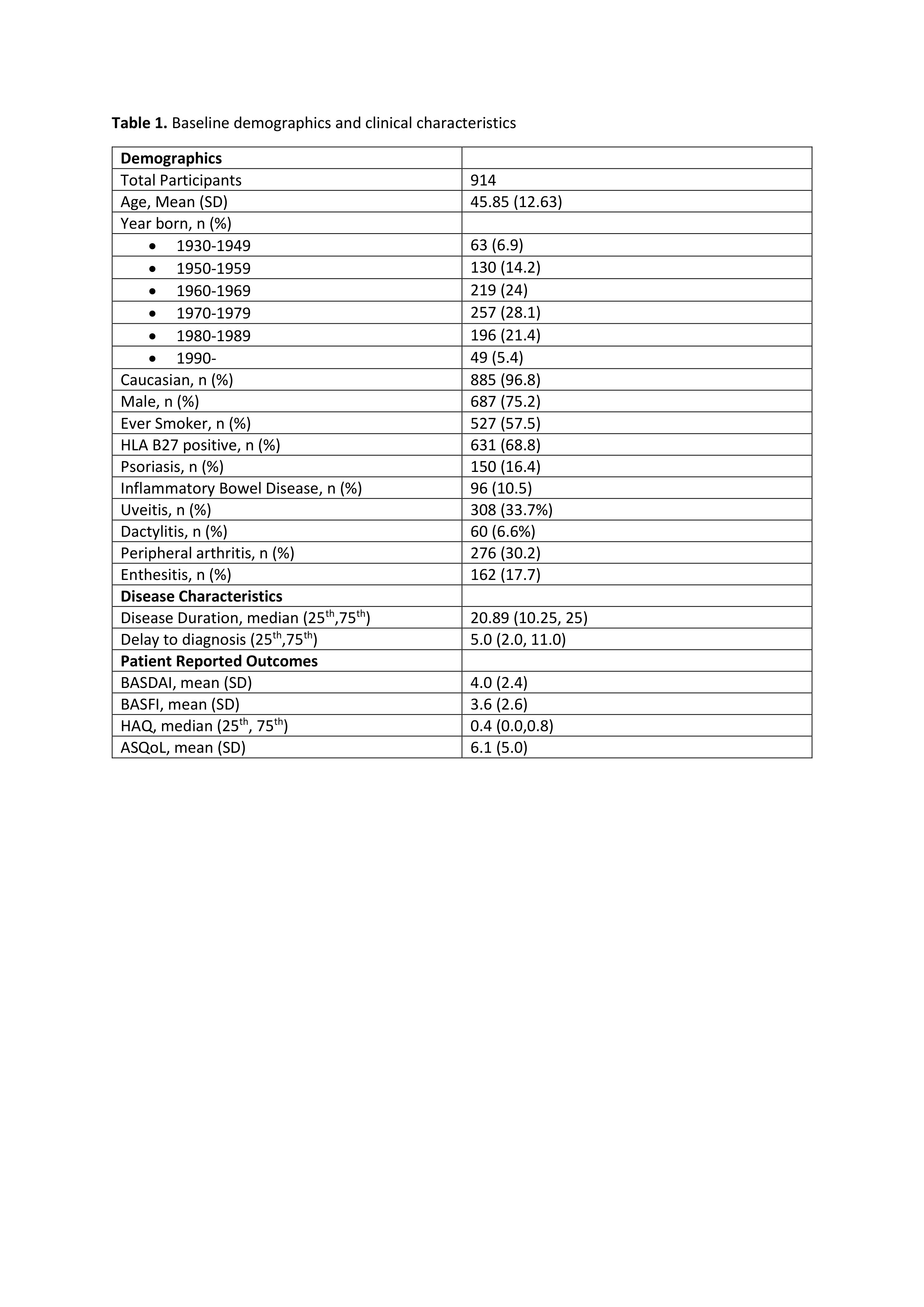Session Information
Date: Monday, October 27, 2025
Session Type: Poster Session B
Session Time: 10:30AM-12:30PM
Background/Purpose: The burden of comorbidities in Axial Spondyloarthritis (axSpA) is increasingly recognised and contributes to the concept of difficult-to-treat axSpA (D2T-axSpA). The need to assess for non-inflammatory causes of uncontrolled disease is vital. We aim to characterise the prevalence and impact of depression in an Irish axSpA cohort.
Methods: The Ankylosing Spondylitis Registry of Ireland is a well-established observational multi-centre study of clinically diagnosed axSpA patients in Ireland. This study was conducted within the framework of ASRI. Depression was identified using a participant-reported physician-confirmed diagnosis.Comorbidities and medication history were compiled using structured interviews. Validated outcome measures including Bath Ankylosing Spondylitis Disease Activity Index (BASDAI), Health Assessment Questionnaire (HAQ), Bath Ankylosing Spondylitis Functional Index (BASFI) and Ankylosing Spondylitis Quality of Life (ASQoL) scale were recorded.
Results: At analysis, 914 participants were enrolled in the registry (75.3% male, mean age 45.85). Basic demographics are available at Table 1. In total, depression was reported in 94 (10.3%) participants. A significant association between age group and depression (p=0.049) was observed, with higher prevalence in older cohorts.Participants with comorbid depression had a higher prevalence of peripheral manifestations of axSpA compared to their peers without depression: peripheral arthritis was more common in those with depression (42.9% vs 29.6% without depression; p< 0.01); 27.5% of patients with depression had enthesitis vs 16.8% of those without depression (p< 0.01); psoriasis was present in 25.3% of cases with depression vs 15.7% of those without depression (p=0.02). No differences were found in dactylitis (6.6% in both groups; p=0.60) or inflammatory bowel disease (13.3% vs 10.4%; p=0.24). No statistical difference between genders was seen when assessing depression in this cohort (11.1% male vs 13% female, p=0.59).Participants with depression had significantly (p< 0.001) higher disease activity scores compared to those without, including BASDAI (5.04 vs 3.81), HAQ (0.76 vs 0.49), BASFI (4.56 vs 3.46) and ASQoL (9.93 vs 6.07) (Figure 1). Unemployment status also differed significantly (p< 0.01) between those with (28.7%) and without depression (16.6%). Depression was also more prevalent in homemakers (13.8% vs 4.9%; p< 0.01).
Conclusion: In an Irish axSpA cohort, depression is a prominent factor affecting approximately 1 in 10 participants. Depression is significantly associated with higher disease activity, poorer functional status, and increased peripheral manifestations indicating a greater burden of disease in these patients.
To cite this abstract in AMA style:
Mac Gearailt C, O'Farrell R, Eltahir M, Hallahan B, Smyth A, O'Shea F, Fitzgerald G. The impact of depression in axial spondyloarthritis: Epidemiological insights from the Ankylosing Spondylitis Registry of Ireland (ASRI) [abstract]. Arthritis Rheumatol. 2025; 77 (suppl 9). https://acrabstracts.org/abstract/the-impact-of-depression-in-axial-spondyloarthritis-epidemiological-insights-from-the-ankylosing-spondylitis-registry-of-ireland-asri/. Accessed .« Back to ACR Convergence 2025
ACR Meeting Abstracts - https://acrabstracts.org/abstract/the-impact-of-depression-in-axial-spondyloarthritis-epidemiological-insights-from-the-ankylosing-spondylitis-registry-of-ireland-asri/


.jpg)